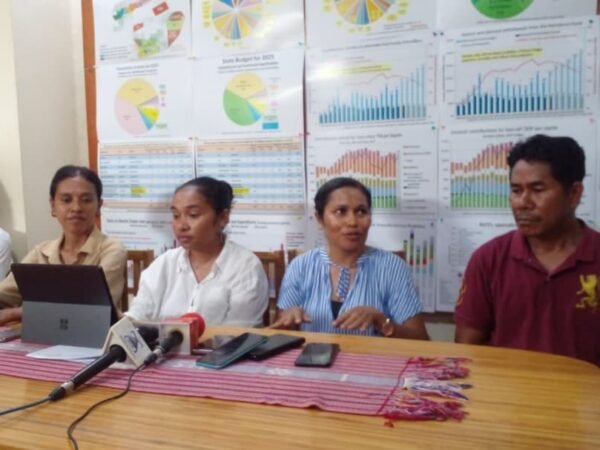Dili, November 6, 2025 (Média Democracia) – The NGO La’o Hamutuk held a press conference urging the National Parliament to debate the 2026 State Budget (OJE 2026) with a vision focused on addressing the real issues faced by the people of Timor-Leste. The conference took place at La’o Hamutuk’s hall in Bairo Central on Wednesday.
La’o Hamutuk’s spokesperson, Elia da Costa Araújo, stated in the press release that the organization appreciates the opportunity to participate in the public discussion on the proposed 2026 State Budget, aiming to contribute analytical insights on the structural challenges that continue to affect productive development and fiscal sustainability in Timor-Leste.
“In October 2025, La’o Hamutuk submitted two documents to the National Parliament, providing critical analysis and recommendations on the agriculture and economic sectors in the proposed 2026 State Budget. Through these submissions, we detailed our analyses and constructive recommendations as reference materials to assist Members of Parliament in discussing essential issues and exercising their competence as representatives of the people to define priorities that reflect the real needs of the population before making final decisions,” said Elia da Costa Araújo.
She added that La’o Hamutuk is deeply concerned with the fiscal policy currently being implemented, which still lacks consistency in contributing to domestic revenue growth. Although the government, through the Ministry of Finance, has acknowledged the urgency of fiscal reform in official documents and speeches, reforms to prevent Timor-Leste from falling into a fiscal cliff remain insufficient.
“The Central Bank of Timor-Leste’s (BCTL) report shows that returns from the Petroleum Fund have declined. Unfortunately, government expenditure continues to increase annually, and the 2026 proposal remains heavily dependent on the Petroleum Fund,” Araújo added.
According to her, the 2026 State Budget proposal totals $2.3 billion, with allocations for key strategic sectors such as education, health, agriculture, water, and sanitation amounting to only 18%, while public administration spending accounts for 31%. This, she said, demonstrates that the government still lacks seriousness and commitment to developing the country’s strategic sectors.
“The strategic sectors are precisely those that the government must prioritize because the majority of the population depends on them. Yet, over the years, the allocation to these sectors has not reflected strong political commitment,” Araújo emphasized.
She added that while the Ministry of Finance has warned the public about fiscal cliff risks, La’o Hamutuk believes that the remaining balance of the Petroleum Fund should be treated as an opportunity to invest in productive and sustainable sectors.
“To avoid Timor-Leste falling into a fiscal cliff in the near or medium term, withdrawals from the Petroleum Fund must be done with caution by rationalizing unnecessary expenditures and maintaining the Fund at a level that ensures long-term sustainability,” Araújo affirmed.
La’o Hamutuk urged the National Parliament to hold a thorough debate and called on the Government to develop alternative plans and invest in human resources and renewable sectors, including agro-processing industries, livestock, fisheries, forestry, handicrafts, agroforestry, and community tourism. According to her, such investments would not only generate fiscal revenue but also stimulate economic development.
She also expressed concern over the lack of transparency and accountability among several ministries in ensuring public participation during the preparation of the 2026 State Budget proposal. Araújo highlighted that many state institutions still fail to fully implement the annual budget calendar or to use their official websites effectively to communicate and share information with the public. She specifically mentioned the National Parliament, Dalan ba Futuru, the Ministry of Agriculture, Livestock, Fisheries, and Forestry, and other ministries.
La’o Hamutuk’s recommendations to the National Parliament and the Government include restructuring the proposed 2026 budget to increase allocations for strategic and sustainable sectors such as education, health, agriculture, water, and sanitation.
“We also recommend that Parliament and the Government take into account the concerns raised by communities during public consultations, which consistently highlight the need to address problems in the agriculture, education, and health sectors. Furthermore, the government must improve its participatory and inclusive consultation methods,” she said.
La’o Hamutuk also urged Parliament to seek clarification from the government regarding the large loan amount, reportedly around $850 million which stated in Article 5 of the 2026 Budget Proposal. Although there has been a reduction in borrowing for essential sectors, she said, the growing trend of loans for extractive industries requires clear explanations from the government regarding repayment capacity to protect Timor-Leste from debt risks.
She further noted that the Tasi Mane Project has already consumed nearly one billion dollars, despite ongoing challenges in its development conditions. Therefore, La’o Hamutuk recommends conducting a thorough review before allocating additional funds. La’o Hamutuk encourage the National Parliament to cut unnecessary expenditures, particularly on large projects with high maintenance costs and unclear returns.
Reporter: Nelfiano
Photo: Nelfiano

